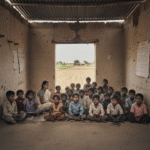India’s Spiritual Shift: Tradition Meets Transformation Across Generations
India, a country deeply rooted in its spiritual heritage, is witnessing a transformation in how religious beliefs and practices are perceived across generations. As younger Indians navigate the complexities of modern life, their approach to faith is increasingly distinct from that of their parents and grandparents. Official data and reports shed light on this evolving landscape, highlighting a growing gap between traditional religiosity and contemporary spirituality.
A Decline in Traditional Practices
Recent studies reveal a decline in traditional religious practices among younger generations in India:
- Pew Research Center 2021 Report: While 84% of Indians still identify strongly with a religion, only 39% of those aged 18-29 report engaging regularly in traditional rituals, compared to 60% among those aged 50 and above. This suggests a generational shift away from ritualistic practices toward more personalized forms of spirituality.
- Lokniti-CSDS 2022 Study: Among urban youth, 25% describe themselves as spiritual but not religious, indicating a preference for meditation, mindfulness, and yoga over organized religious institutions.
The Role of Technology and Globalization
Technology and globalization are major drivers of this shift:
- Social Media Influence: Platforms like Instagram and YouTube have popularized new-age spiritual practices, often divorced from traditional contexts. Hashtags like #Mindfulness and #SelfCare have millions of followers, with younger generations turning to guided meditations and wellness apps rather than temples or mosques.
- Exposure to Global Ideas: Access to global philosophies, from Stoicism to Zen Buddhism, has expanded the spiritual repertoire of Indian youth. A report by the Centre for Global Development Studies highlights that 45% of millennials in metropolitan cities have engaged with spiritual practices originating outside their cultural heritage.
A Shift in Priorities
Younger generations prioritize flexibility and inclusivity in their spiritual pursuits:
- Gender Equality and LGBTQ+ Inclusion: A 2023 survey by Youth Ki Awaaz found that 62% of respondents aged 18-35 believe religious institutions need to evolve to become more inclusive. This contrasts with older generations, who are more likely to view traditional structures as immutable.
- Focus on Mental Well-Being: Mental health awareness has surged among Indian youth, with many turning to spiritual practices for stress relief rather than religious salvation. Apps like Calm and Headspace report India as one of their fastest-growing markets.
Generational Tensions and Bridging the Gap
The divergence in beliefs and practices between generations often leads to tensions:
- Family Disputes: A 2023 Azim Premji Foundation report highlights intergenerational conflicts over faith as a common issue in urban households. Younger family members may resist participating in rituals or festivals they view as outdated, leading to misunderstandings.
- Preservation of Traditions: Elders often express concerns about the erosion of cultural identity. Many see the younger generation’s move away from traditional practices as a threat to the continuity of religious heritage.
Opportunities for Harmony
Despite differences, there are ways to bridge the generational divide:
- Dialogue and Education: Encouraging open conversations about the meaning and purpose of religious practices can foster mutual understanding. Schools incorporating religious and cultural studies could help younger generations appreciate the value of traditions while allowing for critical engagement.
- Modernizing Rituals: Some religious institutions are adapting to changing times. For example, temples offering online darshan or incorporating eco-friendly practices during festivals have found resonance with younger audiences.
Conclusion: A Landscape in Flux
Generational differences in religious beliefs are reshaping India’s spiritual landscape. While older generations emphasize tradition and collective rituals, younger Indians are crafting a more individualistic, inclusive, and globally influenced approach to spirituality.
This shift is not a rejection of faith but a redefinition, reflecting the dynamic interplay between continuity and change. As India balances its deep-rooted spiritual heritage with the aspirations of its youth, the future of belief promises to be as diverse and evolving as the country itself.




























